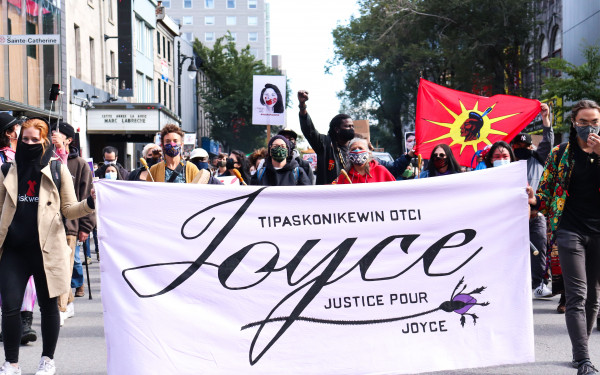School Board Closures: A Right-Wing Tactic
How the Past and Present Should Make Us Concerned About Bill 40
Abolishing school boards across Quebec and turning them into service centers is a quintessentially right-wing tactic.
The Coalition Avenir Québec government’s move to pass Bill 40 in February 2020 seriously risks lowering the quality of the education of Quebec’s children.
It could also harm the communities behind anglophone and francophone school boards.
Prior to the 1960s, most of Quebec’s schools, francophone universities, hospitals, and social services were overseen by the Catholic Church, a primary institution of colonial Quebec society.
When the British North America Act came into play, it brought education under provincial mandates and divided schools into two separate educational streams.
Until 1964, schools were administered by the Department of Public Instruction, divided between a Catholic and a Protestant committee.
Catholic subcommittees formed under this department in Quebec with a distinct curriculum and brought teaching personnel directly from the clergy.
From 1960 through 1966, Premier Jean Lesage gradually ushered in an expansive set of reforms for Quebec society. During this time, the Parent Commission of 1963 convened to discuss and settle on the details of this educational reform.
Quebec was emerging from the era of La Grande Noirceur, or the Great Darkness, and the province became secularized in an effort to elevate their standards relative to other provinces.
Education became a top priority in Quebec under Premier Jean Lesage and became the emancipatory answer for French Canadians.
The Parent Commission produced a five-volume report that framed education as a right and no longer a privilege and sought to secularize it.
Key reforms implemented by the Liberal government included creating the Ministry of Education and rolling out Operation 55, which reduced Catholic school boards from 1,500 to 55, while Protestant school boards were set at nine.
The switch to language-based school boards began in the 1990s, when Quebec’s pool of immigrants widened and the religious school system no longer reflected the needs of Quebec’s broadening society.
An amendment to the Canadian Constitution in 1997 excluded Quebec from its provincial duty to divide Canadians between Catholics and Protestants, thus dawning the era of English and French school boards.
Fast forward to August 2018, when the centre-right CAQ party vowed in its electoral platform to abolish school boards for an educational system that is more “people-focused.”
In February 2020, the CAQ government delivered on that promise and invoked closure to limit debate in the National Assembly to speed up the passage of Bill 40.
As of next school year, school boards are to be abolished in Quebec and will be transformed throughout 2020 into regional service centres, aiming to bridge the management of schools and the families of public school students.
These service centres will be overseen by governing boards, where the English sector can elect its board members, while the French sector will have them appointed by the Ministry of Education.
These ill-consulted reforms are concerning.
By turning school boards into service centers, the CAQ is decentralizing authority and undermining the responsibility that school commissioners and chairpeople are trusted with.
The government is restructuring the Quebec public education system based on market conditions and the allure of private firms.
Cutting down on bureaucracy, also known as “red tape,” is a traditional tactic of right-wing governments with neoliberal agendas.
Cutting down on red tape happens when governing bodies are seen as “too big” in size and scope and are perceived as a burden to the public sector.
The Ministère de l’éducation, du loisir et du sport administers funding through federal transfers, while school boards have full authority to allocate the funding they receive.
In October 2019, a scathing report published by the government auditor accused the English Montreal School Board of mismanaging millions in private contracts with private schools not registered on the government’s electronic bidding site.
As private schools, they are not required to go through the government’s bidding process.
EMSB commissioner Julien Feldman says that he and fellow commissioner Agostino Cannavino have been complaining about cost increases due to poor budgeting and the lack of a competitive environment within the bidding process for many years.
This means school boards are likely to overspend for necessities like furniture supplies for a new school and building inspections.
Since the last major reforms in the 1990s, Quebec has been operating under public policies that restrict public money and have decreased control over state sectors—causing educational institutions to operate and act like private firms.
The EMSB conflict is but one example.
The transformation of the province’s role over the past two decades is a result of fiscal discipline and the effects of austerity in public spending.
Under budgetary constraints, subsidizing private schools became an effective measure for MELS to privatize the education system and stimulate the development of higher educational institutions at the cost of public schooling.
Originally, the Private Education Act was established in 1968 in order to designate which institutions received state subsidies and to what extent.
According to “Neoliberalism and education: A case study on Quebec,” a thesis written by McGill master’s student Punjita Bhardwaj, this act emerged from concerns about the intense democratization of the Quiet Revolution and was intended to protect religion and its role in Quebec’s social history.
The government used this same line of argumentation and mirrored the libertarian values from the private sector when it published The Estates General on Education, 1995-1996: The State of Education in Québec.
This was the advent of neoliberal ideology in Quebec, Bhardwaj argued.
Incorporating end-of-cycle examinations and standardized tests became a way to focus on the profitability of education and treat it as a numbers game, instead of dedicating those millions of dollars towards alternatives like experiential learning.
With service centers, more responsibility and work is given to fewer people, receiving limited financial compensation to manage public schools across the province at primary, secondary, and vocational levels. Board members receive a mere $100 per monthly meeting.
Meanwhile, Education Minister Jean-François Roberge is expecting a lot more volunteer work from parents, who already must balance careers and family life.
Reducing school administrations to simple service centres and a lack of legislation on private education turns Quebec’s public education away from being a social right and space of local democracy and equity.
Since Bill 40’s passage in the early hours of Feb. 8, 2020, many problems have arisen.
The reform’s effects are felt as opposition members of the National Assembly are in a furious panic as French school commissioners are dismissed, effective within the first week of the legislation’s implementation.
Parents feel helpless as to who to turn to throughout the transition.
The Quebec English School Board Association and the Alliance for the Promotion of Public English-language Education in Québec recommend that the provincial government start with a clear vision.
A white paper is recommended to keep track of consultations and to form an evidence-based plan for change.
This, ex-MNA Geoff Kelley is quoted as saying in the press release, would get consensus from every party involved and ensure the best results for students.
Improving voter turnout rate in school board elections is also another key solution.
Everyone who pays school taxes—property owners and tenants—should have a say in who gets elected to manage these schools.
Financial cuts to public education suggest the minister’s misdirected frustration at systemic issues.
The quality and accessibility of public education should not rest on the backs of overworked and underpaid individuals.


_600_832_s.png)



_(1)_600_375_s_c1.png)
